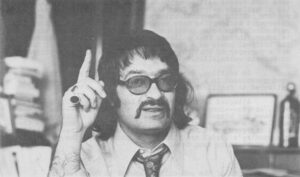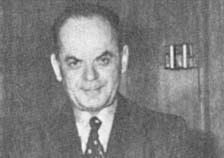“I been havin’ a hard time Livin’ the good life…”
From The Grateful Dead’s album,
— Workingman’s Dead
A great and time-honored tradition was dealt a staggering blow this year and yet (perhaps it was the primaries, the war, or the players’ strike) almost no one noticed.
Robert Evelyn, author of seven increasingly filthy novels, has retired from pornography in search of “a straight job.” A giant is gone, victimized by integrity, liberals, “flip-strength,” and the economy.
Before alarm seizes pornophiles everywhere, it must be admitted that the tradition of young American expatriates writing dirty books to support themselves abroad continues in competent hands. Others have picked up the torch where Evelyn let it fall, but his retirement has left the field shaken, and insiders are speculating that other tremors may be expected soon. There are grumblings in Amsterdam, and mutters on Ibiza. There is a touch of despair in the Parisian Spring.
Robert Evelyn’s retirement, at 29, came on his doctor’s orders and his wife’s insistence while he was still at the height of his creative powers. Indeed, the former University of Alabama student had just completed the last quarter of a four-novel contract with Midwood Books. He had read his work at an Amsterdam sex festival to the strains of a transvestite string quartet, and had been lionized by what he calls “the dirty old men” of the publishing industry.
It is ironic that sociologists, searching over decades for the victims of pornography, and not finding them, should have failed to study the pornographers themselves. Yet Evelyn is clearly as much a victim of his job as is the worker injured by an assembly-line gone berserk. And while pornography may not, as some once supposed, drive its readership insane, the prolific young Evelyn is only one example of an author pushed beyond the brink by his own dedication. Yet Workman’s Compensation will not cover the pornographer despite the hazards of his job.
Sexual Avant-Garde
It began with the rout of blue-noses in liberal courts around the world.
As porn moved from the black market to the super-market, from Tijuana to Racine, a huge demand for the product was awakened. Repressed for centuries, the demand soon exceeded the existing supply, creating, in effect, a kind of sexual Bear-market in which Evelyn and his colleagues prospered. Those days are gone forever unless, as some pray, a new wave of repression will rekindle the demand while limiting the supply.
But that doesn’t appear likely to happen and Evelyn, whose fees have shrunk to $800 per novel, has turned to other work. Currently he is engaged in revising an earlier novel that was rejected because “it wasn’t dirty enough.”
“I’m converting it into a Gothic romance,” he explains, adding that he’s always been interested in ESP.
It was not economics alone that drove the handsome author of Model For Porn to less exotic endeavors. It was also a matter of integrity. The liberalization of laws relating to pornography resulted in, among other things, publishers’ demands for “less art and more flip-strength.”
In earlier years, pornography’s legal status was contingent upon a given work’s claim to possession of redeeming social value. It had to be literate and, preferably, to deal with a theme of relevance to the society. To cope with those troublesome conditions, and simultaneously to meet the demand for more and more dirty books, publishers were forced to rely upon young, unpublished, usually broke poets and novelists, many of whom lived abroad.
It was in their camp that Robert Evelyn was numbered. They did not turn out pornography but, in his words, “created erotica.”
“You can’t really do much with pornography,” Evelyn explains. “Because pornography comes from the word porn, and that word relates to prostitutes, bought sex, and feelings sold for bread. So you can’t elevate it, because you’ll never change that relationship. Erotica, though: erotica is something which is done with an element of love in it, with an altruistic motive and real feeling…”
The distinction, while perhaps unimportant to the middle-aged businessman in Dubuque, made all the difference to Evelyn, and others, writing in Denmark.
“Sex,” as Evelyn explains, “was avant-garde. We wanted to liberate people, to show them where it all leads.”
Flip-Strength
But liberal court rulings soon paved the way for the super-hard-core opus, and industry publishers quickly ordered their authors to abandon the historical style which leant the field legitimacy. In the same way, social themes became a liability where they were once an asset. Gone is the pornographic anti-war novel. Gone is examination of the Victorian Era’s seamier side.
“Market studies show,” Evelyn says, “that the publishers have a solid market among businessmen. They make a lot of money from them, they don’t want to offend them, and they’re not interested in becoming more socially visible.
“Flip-strength,” he concludes, “is all they’re interested in.”
Flip-strength is an industry expression which refers to the frequency of appearance of four-letter words (of any length) that were formerly taboo. It is generally believed that most pornography is bought by purchasers who hastily scan the books in an assessment of their flip-strength. The ultimate in flip-strength would be a book whose contents are limited to page after page of four-letter words with no spaces between them.
Character, setting, and style are all unwanted. What is left is the nakedest of prose, and the barest of plots.
“It is, after all, action-literature,” Evelyn notes.
In a sense, it was better for the creators of serious erotica when it was produced within the context of an “underground.” There were meaningful literary criteria, and the literati could be relied upon to rally in defence of a controversial book and its author.
Today, the porno-industry is obsessed with “flip-strength” and their own lack of visibility, while conventional publishers are reluctant to be confused with the pornographers. The result is that large amounts of pornography is churned out daily while “respectable” publishers shy away from, if not sex, erotica. It is as if the porno-industry contends “If it’s literature, it can’t turn you on,” while conventional publishers hold that “If it turns you on, it can’t be Literature.”
The creator of erotica is caught in the middle.
Exploited
“Things used to be better economically,” Evelyn says. “The fees were larger, although they were still just flat fees. You’d sign a contract, with movie rights assigned such and such a way, and foreign rights and other rights, and the contract would give you 4 — percent of the royalties. But the editor would sort of wink and say, ‘You know, you’ll never see it.’ And they would print 40- or 50,000 copies, selling them at $2 each, paying $1200 for the manuscript, and having a huge plant: they’d make a fortune. And all the while they’d be running the business on a shoestring, telling all their employees that nothing was going well at the time. And they were actually making incredible profits. They still are.”
Moreover, the economic realities of the pornography industry result in a mass-production bias that prevents individuality.
“They’re getting books which will be selling for about 3 or 4 months on the stands,” Evelyn comments. “Brandon House, my first publisher, did about four or five books a month, and Midwood, my last, put out about 12. So they had a constant turn-over, with little interest in checking back to see how anyone was selling. It was almost entirely on flip-in sales, and there were never any reviews.”
The result was the anathema of any author: anonymity. “It became like producing toothpaste, or non-returnable bottles: a commodity and nothing else.” Evelyn says.
Nor is the author encouraged to take an interest in his work. “It’s all in the contract,” says the retired pornographer. “They tell you that once you’ve given them the manuscript — that’s it. You have no control over editing, the title, or anything else. I don’t even know if my last four books are on the stands yet.”
Indeed, the editing Evelyn mentions is often merely a routine matter of beefing-up a book’s “flip-strength.”
“I found whole sections of my books missing,” Evelyn notes, “and there were other alterations: words substituted, and things like that. But I think that if you’re an editor of this junk, doing it day-in and day-out, you have to divorce yourself from it. Most of the editors are college graduates, English-majors, girls who don’t want to be secretaries, married people with kids, and like that. The only way they’re able to hack all this is to treat it as a job and not get involved at all.
“I couldn’t do that.” he adds, “because I really believed in the stuff. I spent six months on each of my first three books, but the last four — I guess they took about a month apiece.”
The Married Pornographer
The industry’s economic practices and boorish editing standards made important contributions to Evelyn’s early retirement, but other problems were at least as serious.
“It was hellish,” Evelyn explains, “trying to be a pornographer, being married, and having a kid at the same time.
“I’d get up at 8 or 9 in the morning when the baby would start to cry, and have breakfast, and retire to the bedroom to write. And, after awhile, the baby would start to yell, and the dog would come in and nose around, and say ‘Hi,’ and then the baby would come in and say ‘Hi,’ you know, and meanwhile — well, there were these football players chasing two cheerleaders around the boys’ locker room. It was bizarre.” Evelyn says.
Mrs. Evelyn, a blonde with the well-scrubbed beauty of a Midwestern girl, concurs. “It was terrible. When he started writing, I really liked his first three books. And then, the last ones he turned out: I thought they were disgusting. So we became very alienated because he was writing them to earn money to buy a house for us in Denmark. But I just wasn’t proud of what he was doing. I wasn’t supporting him, and he began to feel like he was all alone in the world. I just couldn’t accept his rationalizations anymore, and no one else could either. And, after all, he was writing them to keep us in money over here.”
Pressure upon the pornographer and his family can come from all sides. While the publisher reaps most of the profits, it is the author who bears the ultimate responsibility for what is produced.
“We were living in a community that had a lot of writers,” Mrs. Evelyn explains. “Most of them were working on their first novels, and were still getting money from home. They were very scornful. They could afford to be.”
“You see,” Evelyn explains, “most people just don’t like, pornographers, no matter how liberal they are. You’re doing something that people don’t understand, or aren’t into, because most people just aren’t rabidly preoccupied with sex. It’s a part of their life, and not their total preoccupation. So, if you make it your profession, you get defensive, and then you turn into a real rapper on the subject, a persuader. And that makes you more obnoxious, because you’re always talking about it. And then things move from active hostility to really not understanding what the person is doing, and rejecting him, and finally you find yourself way out on a limb with a bunch of dirty old men. I mean, you’re left with people who have been through so much flesh in their work that they have no respect for anyone any more. And those are your co-workers and contemporaries, and they’re about the only ones with whom you can communicate.”
Thinking about what he’s just said, Evelyn pauses and then adds, “It gets rather un-real, in fact.”
Crack-Up
Evelyn’s crack-up (he was institutionalized for six weeks) came, in large part, from the conflicts inherent in his work meeting up with his distaste for hypocrisy.
It is a creative-writing-class maxim that young authors should only write of things they know best and avoid relating experiences they’ve never had. This is easy for a novelist who wants to write about, for instance, life in a factory-town: he can go to one and live there for awhile. But what is the sincere pornographer, perhaps with a wife and child, to do? Marketing realities of the pornography industry dictate that there is almost no demand for books relating the ordinary experiences of a happily married man and woman.
Instead, the pornographer has as his subject matter activities normally considered taboo. And he is forced to work, like a mine, the contradiction between private fantasies and moral inhibitions, an activity which thrives upon guilt: the readers’ and the pornographer’s.
“I took the field seriously,” Evelyn says. “I approached it with the idea that the whole world is composed around sex, and that if people weren’t sexually hung-up, then things would be okay. That is, if people did what they really wanted to do, if they would follow their impulses — well, some of them would be good or bad, but if they would just follow them to find out if they worked, and forget about ‘good’ and ‘bad’…I was very naive. I believed that you’ve got it if it makes you feel good, and that you haven’t if it doesn’t. But that’s a very active kind of discipline, you know, and it really interfered with our marriage and everything else.”
“I got to the point,” he continues, “where I said, ‘Wow! I’m a published writer, I’ve given a reading — there were hundreds of people at the festival in Amsterdam who pretty much felt that pornography is a legitimate field, and even if my wife did want to leave the reading to see the transvestite string quartet, I’m an artist. And I’m not going to hide the way I live anymore.’
“Well,” Evelyn says, “my wife’s parents came to see us at about that time. I was exhausted. I’d just driven 15 hours straight back from the festival. The kid had cornflakes all over the floor, and I was into uni-sex at the time, so I was wearing my wife’s clothes and sunglasses and saying to her parents, ‘Well, here it is! We’ve always cleaned it up for you before, and you were scornful of that, so here it is: uncleaned-up, and this is exactly the way we live!’ Then I took out my books and showed them to her mother, and dropped some photographs we’d taken on the floor, all the time saying ‘This is what we’ve been doing. This is our life.’”
“The next day,” Evelyn adds, “I was in the bin. Looked up in a loony-bin in Southern California, of all places.
“My father had been called, and held come and gotten me in Denmark, and, by that time, I was really clowning. Because all that I’d done was tried to show my in-laws how we lived, and it had caused an enormous stir. I was so happy, so free, making all sorts of jokes and going limp on the plane. Because I thought it was funny the way people took it so seriously, as if it were a personal threat to their own sanity.
“But…you just don’t wheel through the airport in Copenhagen and wave hello to everybody like the savior’s arrived, you know?”
Sexual Politics
There is a temptation to look upon Robert Evelyn as an anomaly, or as an anachronism, to view him as an unusual man threatened by morbid preoccupations within an untidy profession.
Yet Evelyn is very much a creature of his generation, unusual only in that he pursued to their conclusion sets of questions and postulates that others posed and promptly dropped.
One is not surprised to find that his in-laws reacted with shock upon learning of his activities. One is, however, a little surprised to hear of his contemporaries’ rejection. It is widely assumed that young people, especially those who are politically aware, endorse an open sexuality.
Certainly underground magazines in the U.S. and abroad have been vehicles of an assault upon sexual inhibitions and propagandists in behalf of spontaneity. Indeed, the admonition to “Do your own thing,” to follow the bent of one’s personality, is a cornerstone of anti-authoritarian youth-culture.
Why then is Evelyn “scorned” by his contemporaries? Why is the pornographer as much an outsider among “liberated” youth as he is among inhibited elders?
One obvious component of that scorn is political: pornography is today created for a middle-aged male readership. Its function is prurient and not socially redeeming (unless an awakening prurient interest is itself redemptive). Its ground-rules demand that the central character be “the lowest common human denominator,” in Evelyn’s words. What is irrelevant to sexual stimulation of the reader must be omitted. Thus, in the interest of economy and to facilitate the reader’s concentration, secondary characters are developed as objects, and not as personalities. They exist to be used. Thus, the literary criteria applicable to porn are inherently reactionary, and are rejected as such by the young of both sexes.
It is unlikely, however, that Evelyn is rejected on such coherent grounds and none other. Pornophobes seldom flee dirty books because of the literature’s bad politics.
In this regard, one notices that many underground newspapers have abandoned the sexual boisterousness which characterized their inception. Today, sex is discussed in terms of politics and, above all, asexually. Indeed, it is an established trend among the “undergrounds” to stop accepting sexually-oriented advertisements, and to eliminate photos and articles which relate to sex outside a political context. The trend is justified on political grounds: such material reinforces reactionary (usually “male chauvinist”) attitudes.
A consequence of this has been the confusion of political analysis with puritanical censorship. Uncertain whether a particular photo depicts a woman as “a sex object” or as a complex, creative personality who happens to be naked, many underground editorial staffs have chosen to avoid the dilemma by ignoring the material entirely. In so doing they must accept several consequences, not the least of which is a decline in readership and, therefore, in their effectiveness as propagandizing instrument.
When they reject Robert Evelyn without bothering to distinguish between pornography and erotica, his contemporaries underline a Puritan bias within themselves that they share with many of their elders. The only difference is that older generations have defended their Puritanism on religious or moral grounds, while youth does so on political ones. In each case sex is relegated to an essentially functional role, shrouded, from political or moral expediency, in mystery.
It is in this context that one sees society, impotent to deal legislatively with conflicts that are “spiritual,” reacting to the problem by attacking those who provide evidence of it. Thus, one encounters a strong reaction against, for instance, “Straw Dogs” (too much violence) and pornography (too much sex). If it cannot suppress the problem, society will act to repress the evidence. In an individual such activity would be pathological: as public policy, however, it is “decency asserting itself.” One recalls that Oedipus (of all people) attacked his eyes when learning of his body’s deeds. It is likely that we attack our artists for the same reasons.
Received in New York on May 8, 1972
©1972 Jim Hougan
Jim Hougan is an Alicia Patterson Fund award winner on leave from The Capital Times (Madison, Wisconsin). This article may be published with credit to Mr. Hougan, The Capital Times, and the Alicia Patterson Fund.









